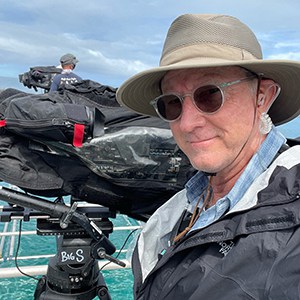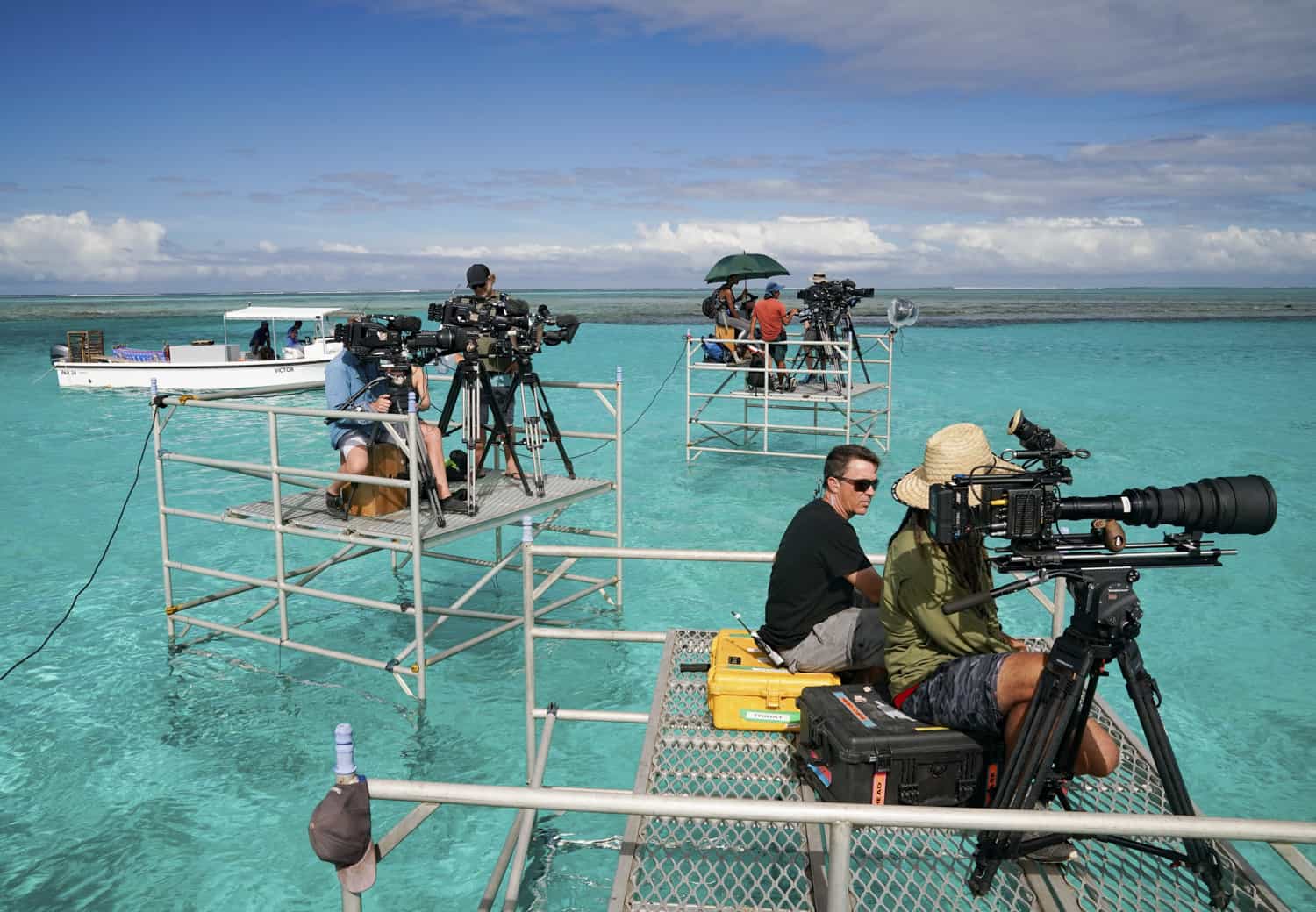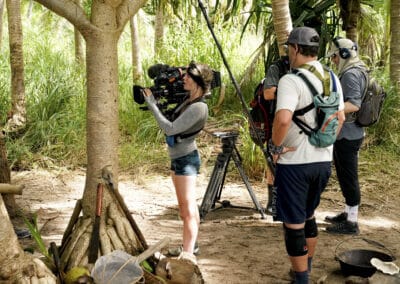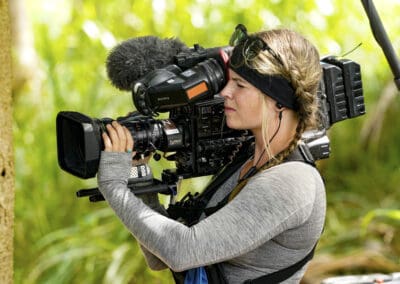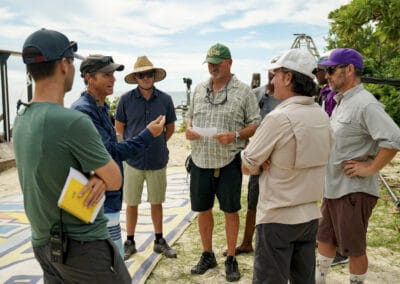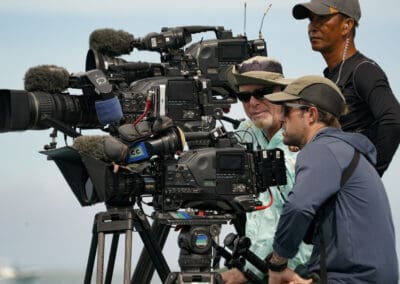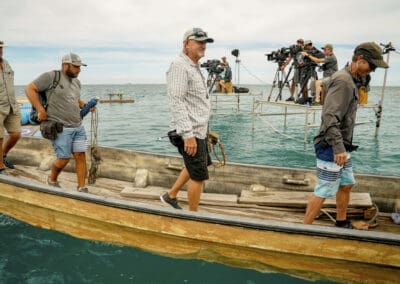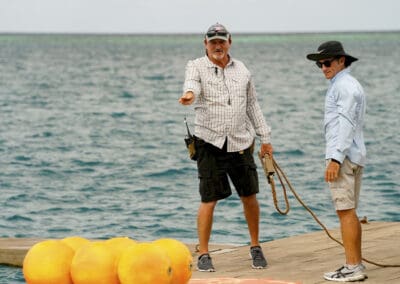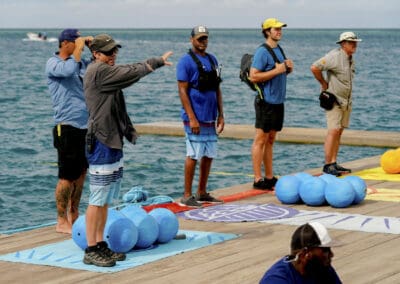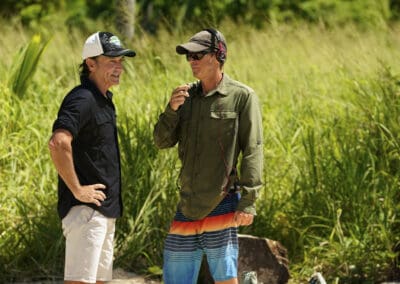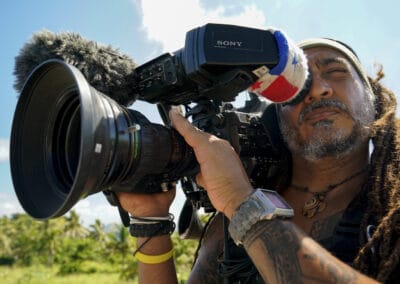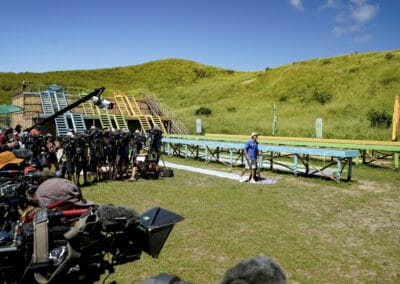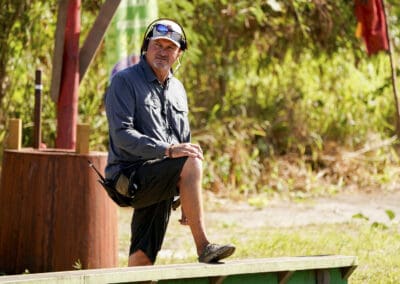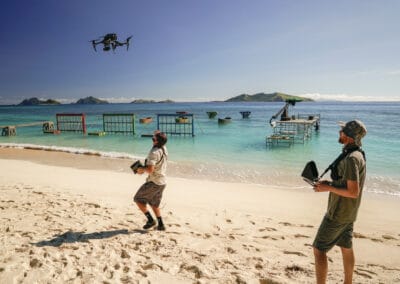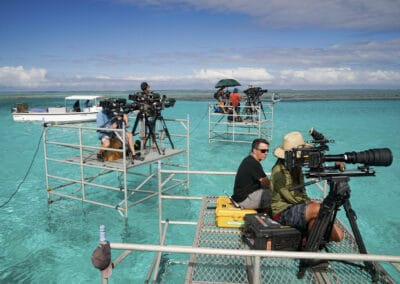SURVIVOR Seasons 41 and 42: Beyond Surviving
Part III
By David Frederick, SOC
Survivor is the American version of the international Survivor reality competition television franchise, derived from the Swedish television series Expedition Robinson created by Charlie Parsons, which premiered in 1997. The Emmy Award–winning American series premiered on May 31, 2000, on CBS. It is hosted by television personality Jeff Probst, also an executive producer along with Mark Burnett and the original creator, Parsons.
The show places a group of strangers in an isolated location, where they must provide food, fire, and shelter for themselves. The contestants compete in Challenges, including testing the contestants’ physical abilities like running and swimming, or their mental abilities like puzzles and endurance challenges, for rewards and immunity from elimination. The contestants are progressively eliminated from the game as they are voted out by their fellow contestants until only one remains and is given the title of “Sole Survivor” and is awarded the grand prize of US$1,000,000. (Source: Wikipedia)
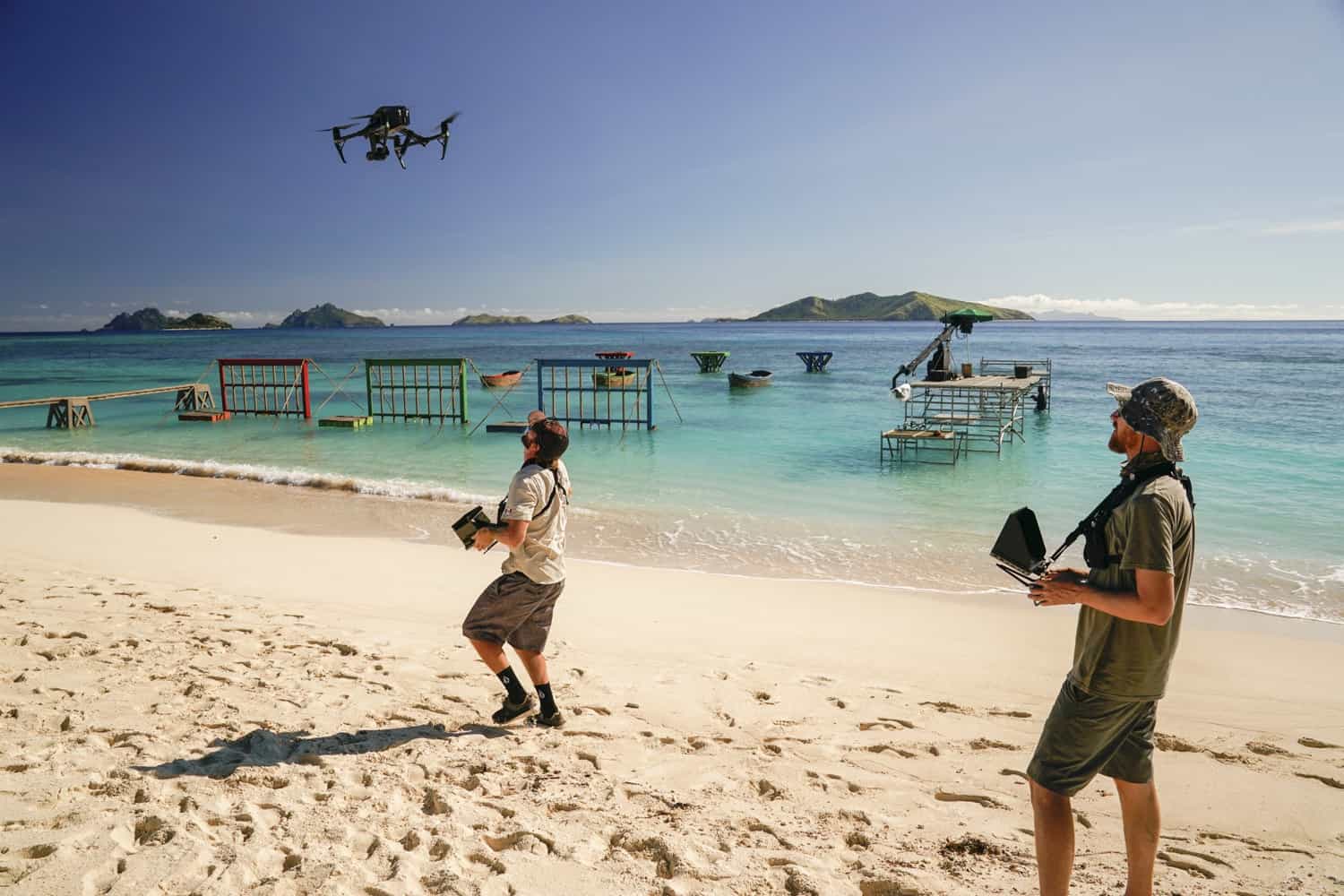
SURVIVOR 40 : WINNERS AT WAR, Day 16.
RETURNING TO SURVIVOR, YEAR AFTER YEAR
Australian jib operator Toby Hogan has been on Survivor since Season 24. Toby has worked in the Challenge part of the show since he started. He swings his jib on the competitions and also on the Tribal Council. I asked him if he ever shot any Reality. Toby replied, “I’ve done reality on Australian Survivor, and I didn’t like it. On Australian Survivor, you do Reality, Challenges, and Tribal Council. So you work very long days. I actually don’t think it’s beneficial to the show to have people working such ridiculously long days and suffering, you know, unbelievable heat on the beaches all day, and then coming out to shoot a Challenge, and then going back to the beach, and then going to Tribal Council. That doesn’t make sense, it’s too much.
When I asked him why he returns year after year, Toby replied, “It’s a lot of fun. I could stay at home and work on other shows, and actually make more money than what I make here. I hate to be that kind of person who agrees with Jeff Probst, calling it the Survivor family, but it is kind of a family. When I’m at home working, I want to come back here, and I want to see these people and hang out with them for months on end. Once you’re kind of embedded into it, it’s just a second family and your family back home understands. Who knows what is going to happen in the world with COVID and everything else. This could be the new normal: 26 days per season instead of the previous 39 days, or two days per episode, per season.”
I asked Toby about the other work he is doing on Survivor and he spoke of the set-up interviews he goes to shoot at the Tribal Camps with the contestants. “Originally, I hated doing it. But once you get into it, it’s really cool because you’re getting the inside scoop of what’s actually happening in the show. These are people who are trapped out on some beach somewhere 24 hours a day, you get the inside scoop into what their mindset is. Sometimes the best part is that you see how completely out of touch they are. They’re sitting there thinking, ‘This is what’s happening.’ You, as an informed person who works on the show, know they have absolutely no idea what’s going on. They think this is what’s going to happen and then off to Tribal Council and they get voted out and they had no idea it was coming.”
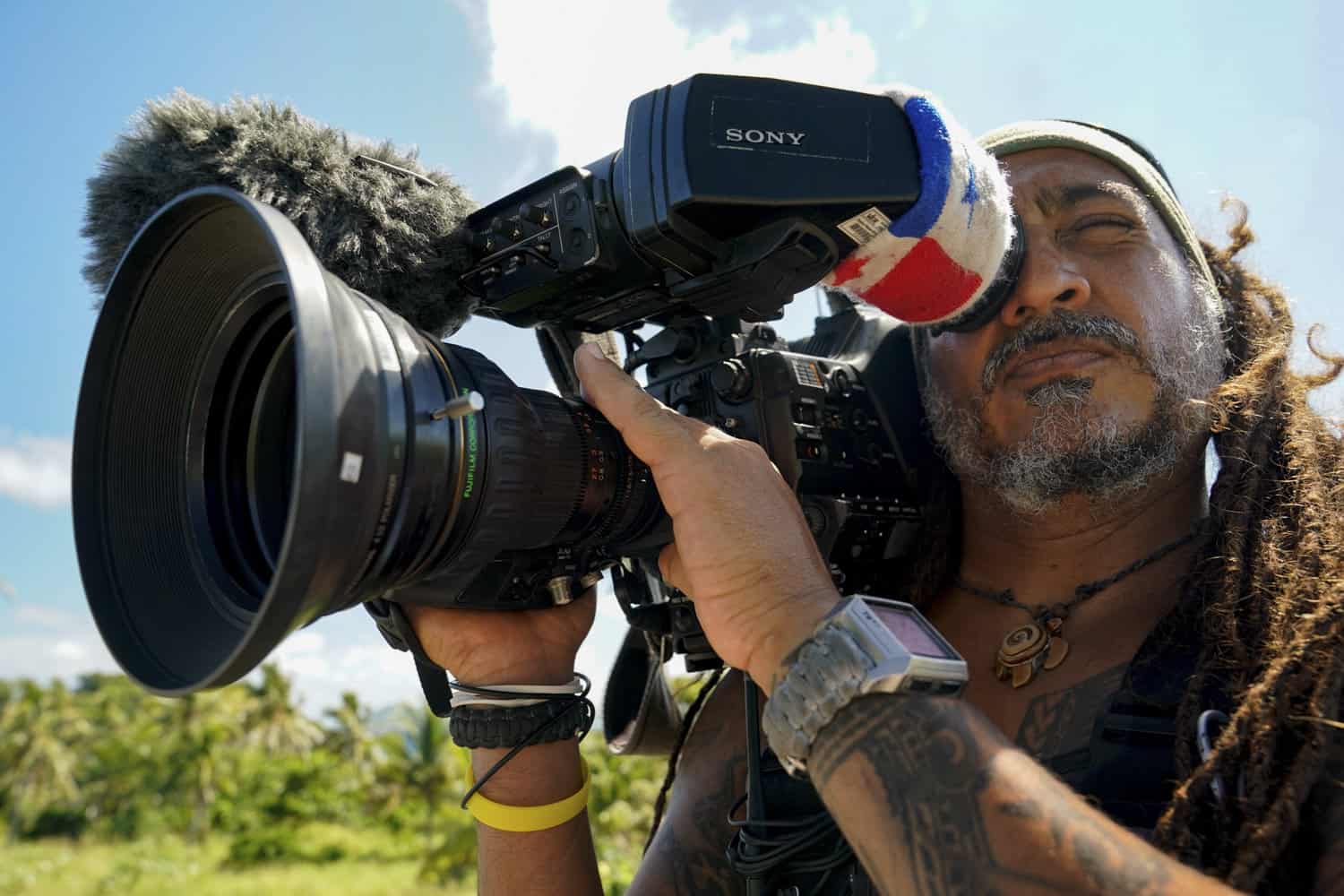
SURVIVOR 41, Day 12.
I asked Toby what his technical set up was for the interviews. “I like to keep it as simple as possible because you have to shoot anywhere from three to six interviews in two hours. When you get out there, it’s low tide or high tide and these things are an issue. You’d love to shoot on the beach and your sound recordist just looks at you and says, ‘Don’t even think about it, too noisy. It’s way too close.’ You get 20 to 25 minutes with each person. Then it’s, bang, bang, bang, you get the questions, get the answers, get to the end. The producer goes to camp and gets the next subject and you literally have maybe five minutes to do a turnaround with a new setting and instantly be ready to go. Depending on where you are, if you’re on the beach, you’ve got to deal with some sun pops, bright backgrounds, dark backgrounds, different colors, and they want to want it to look nice. You’re gonna have nice ping in the eye. If you’re in the jungle, so to speak, in some parts where you do the interview, you have to light the backgrounds as well, as they can become so dark. We run a cream source light, it’s a battery-powered strong LED. We also run an Astra with a Chimera. Depending on who I’m lighting, how much time I’ve got, sometimes I run them both, 50/50 tungsten and daylight. I do like to warm it up a little bit and might make them look pretty. Were also using 4-by-4 and 6-by-6 silks, nets, and flags.”
“There are times that you find a spot that does it all fantastically. You’ve grabbed everything and you’re kind of like, ‘nah, no lights.’ I just put a silk here on one side and a negative fill there and put a net overhead because it’s too bright up on that tree. It’s funny because we do actually spend a lot of time making the shots look great and I’m not sure if the powers-that-be actually notice. Then it’s on air for only 25 seconds.”
“Although this might sound easy, on my jib, I’m kind of on the safety wide shot that can be cut to at any time to tell the story of where everyone is and what’s going on. What’s important is to keep all the other production elements out and all the contestants in the front. Although it all sounds very obvious, you’ve got to be in focus and expose properly. Being on an island, you have to deal with bright white hot sand with African American contestants and the potential of jib shadow. Shadows are a big issue. I am hiding my shadow, the cable cam shadow, the hand-held operator’s shadow. You just want to tell the story in that wide shot that is always available as a cut away. In the event of one of the handheld operators being in my shot, I will tighten my frame to keep him out. What I find best to do is zoom into one of the contestants, and you start on them. Then, as the handheld operators leave, you can do a nice production move out, not too slow, not too fast, just that kind of nice, coming out to reveal everything.”
“We’re using the Stanton Triangle Jib. I have guys who’ve been with us since the Philippines, which was like Season 25. They’re Filipino and they’re fantastic. They absolutely know the machine as we’ve taught them. They treat it like it’s gold, and it’s wrapped up and protected as it travels about from location to location. If anything is a technical problem for them, it’s changed instantly. Since being in Fiji, we’ve also trained the locals on this level. All the grips who are who local grips are all now trained Jib technicians.”
Toby was a treat to talk with. He has so many stories, as do most of the Survivor crew members, of the wonderful and amazing things that occur on the show. Here Toby tells a tale of what went wrong once on Survivor: “It was my first season on the show, the opening day, and I’m on the ship. It’s not my Jib equipment I am using. There’s a big helicopter flying in host Jeff Probst, there are vehicles arriving. Probably about a minute into the opening sequence of my first season on Survivor, the jib completely shuts down. I’m kind of trying to fix it and do this and do that. We got the power back up but then the iris wouldn’t work and wouldn’t zoom and the focus stopped working. I’m kind of sitting there thinking…Jeff just flew in in a helicopter and I’ve got none of that. These three vehicles just emerged out of the jungle and they all pulled up and everyone jumped out and I don’t have any of that. We get to the end of it. I had to walk over to Dryden, our producer/director, and tell him that I’ve got none of that. I don’t have a frame of it. I’m sitting there thinking to myself, this is my first day, probably now my last day. I tell the director, ‘Yeah, no, umm, I’ve got nothing.’ Then he said, ‘When did it stop working?’ I said, ’Oh, as the helicopter flew in.’”
ADVICE ON GETTING ON A SHOW LIKE SURVIVOR
In the course of my career alongside and now behind the camera making films and television, I am often asked what does someone do in order to be a part of the industry, get a job like mine, or make a greater success out of their career. I am always happy to share my experiences with those who ask. I thought, what better place than Survivor to ask these talented people what they suggest as advice or warnings about getting work like this.
Nixon George, Reality camera operator, said, “My only advice is just keep pushing. If this is what you really want to do, don’t stop. If you see an opportunity, even if it means going up on your day off to put in some extra work or work in a few extra hours, go for it. Most times you get what you want. It might take you a bit longer than you expect. You can put yourself in a better position if you keep working. It’s worth it.”
Louis Powell, Reality camera operator, offered this: “So much of this job is social and being a team player. Being able to do the job, wielding the camera like it’s an extension of one’s self, while at the same time, really listening to story. Being able to play well with others, is a given. You have to be fun to hang out with!”
Toby Hogan, Challenge jib op, offered up this advice. “I would say for a young, single person, this is an incredible industry to work in. You get to travel the world, you get to do amazing things, you get to play with great toys. I say this now as a 50 year-old person to my 20 year-old self, you will end up divorced, you will spend more time away from home than you do at home.
Sometimes it works, sometimes it doesn’t. If you’ve got an industry husband or wife who understands, it tends to work better. Those who are not from the industry don’t understand. And they’re just like, ‘You’re never here.’”
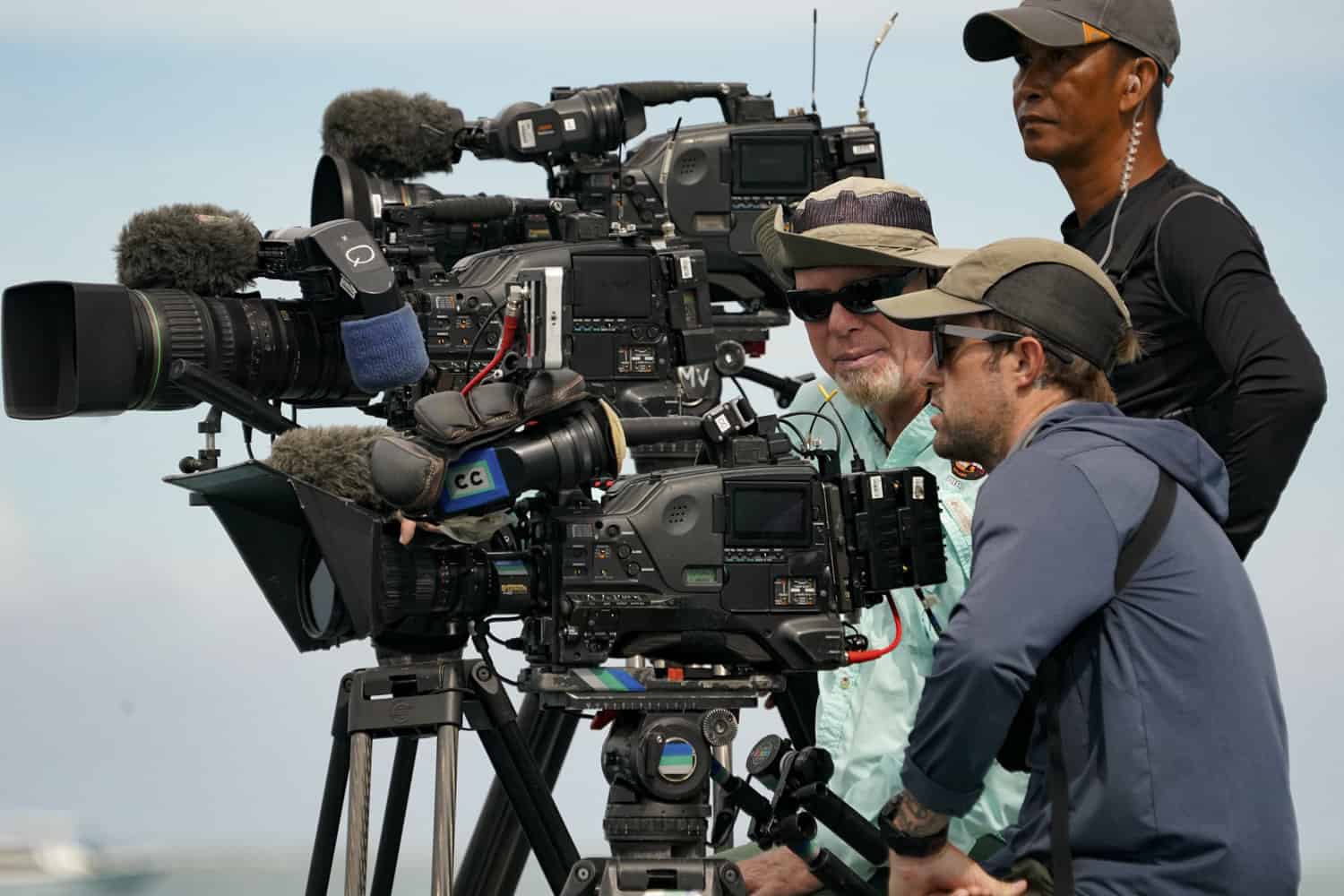
SURVIVOR 41, Day 15.
Jeff Phillips, Reality camera operator, said, “My biggest piece of advice is to set your sights on a specific and attainable goal and work towards it wholeheartedly, with passion. Be flexible and learn to adapt to various situations. Along the way, be a good person and treat people with respect. Surround yourself with people of different backgrounds and experiences, and learn all that you can from them.”
Josh Bartel, Reality camera operator, shared, “I did four years of film school, and I originally wanted to do music videos and commercials. I got lucky that I went to a job fair and was able to get on Survivor’s Dream Team. And I realized, at that time, there was a lot of work in reality. There was a lot of travel involved. And it was fun, with great people, and you’re constantly changing scenery. I don’t regret having gone to film school. But it also didn’t really benefit me, outside of the fact that there was a job fair that day. If you’re not super keen on college or film school, and you want to get into reality or a production company that does documentaries, give it a shot as a driver or production assistant to get in where you can.”
“Watch a ton of documentaries and docuseries. Reality people, no matter what we’re shooting, are right on the front lines of what the next look is, whether it be a TV show a documentary or reality show. Always be learning always be kind of pushing yourself. Some shows you’re going to work with like really bad cameras and some shows are going to work with amazing gear. That’s just part of being a freelancer. Stick with it. Don’t give up hope.”
Josh continued, “Try and get your foot in the door. Don’t be too big for any one job. Just be humble and be willing to work hard. There are so many groups on Facebook to connect with. Alternately, you’re probably going to need to end up in Los Angeles, Atlanta, New York, or Dallas, so be willing to make that move. You’ve got to be willing to sacrifice a lot of things.”
“I think I would add also something from a camera perspective: think of yourself almost as an athlete because of the physical demands of our job, so staying in shape and having good habits when you’re not working are really important to have good performance when you do get a job. Take care of your most important tool—your health.”
Rodney Chauvin, Reality camera operator, offers this advice. “First of all, I think, personally, I think you need to listen. I think you just got to follow your passion, what your bliss is like, if you love taking photographs, and you want to do it for a living. I say go for it. If you want to tell stories and work on a reality show, it’s a hustle, you’ve just got to have the passion. If you have the passion, you’ll find a way to get in the business. It’s pretty simple. If you really want to go for it, you could find a way, there’s not one certain way, you can trailblaze your own way on how to get into the business. And I say, if that’s what you want, go for it. Are there any skills that you would recommend people hold up on? Ha ha, if you don’t have the skill, fake it till you make it, learn it again till you make it.”
ON PAYING IT FORWARD
My long lens partner Kevin Garrison has a very strong sentiment on paying it forward, something that I think the SOC community will be happy to learn about. Kevin explained to me, “I thought, I’ve had a successful career. I want to give back. So I designed a way where I can give back to people through a professional camera workshop. It’s a way to help people after they’ve graduated college, film, or production school, and transition from school into the working professional world of television. It’s often very difficult for people to do it on their own. We all need to meet people and the right people can help each other. I put together Big Kev’s Workshop. Even if they didn’t go to production school and they were interested in running camera, I give them a course on not only how to run a camera, but all you need to know about being an independent freelancer. After a while you get a good reputation and then you work with directors who like your work and the next thing you know, you’re asked to do a season of football, a year full of golf, and you fill in your schedule with a variety of televised sports jobs, and then perhaps a gig like Survivor comes along. If you do a good job and you’re attentive, creative, and you do the things well that you are asked to do, you’re going to get asked back. That’s pretty much how the freelance world works. These are some of the things I also talk about in Big Kev’s Workshop.”
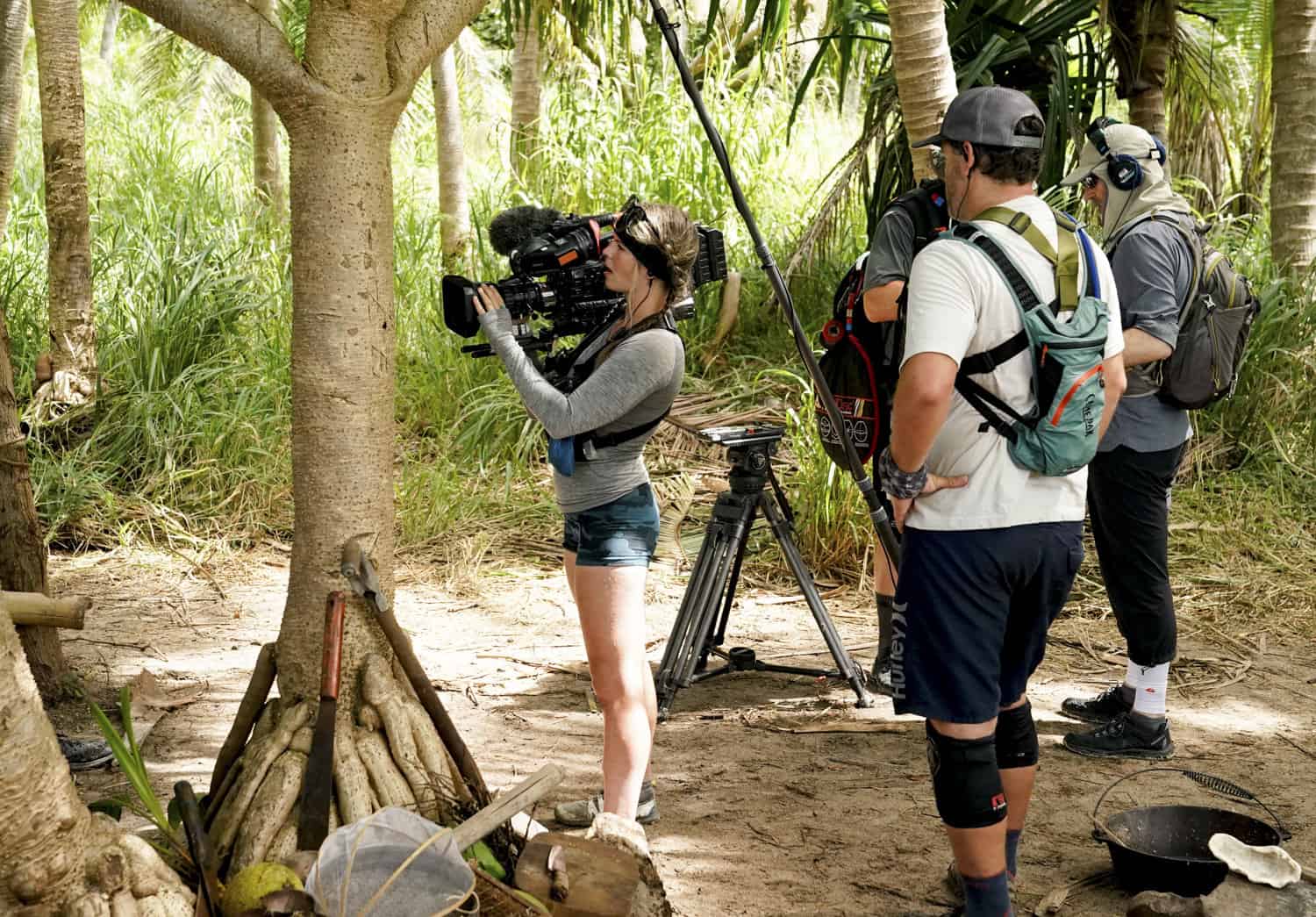
SURVIVOR 41, Day 20.
Finishing up, since I started with Challenge camera operator John Tattersall, I thought that I would have him have the last inspiring word on a successful life in the camera world. He was very keen on sharing his valuable insights.
“It’s a people-person industry,” John said. “Have awareness about how to work with people. You can’t learn this stuff in school or on a YouTube video. I think if someone who’s starting out has any opportunity, any experience, any chance to get to work with a group of people, even if it’s not filming, it’s going to be helpful. Obviously, a film shoot would be better. Just get as much experience as you can, in any department. Even if it’s not camera, you can work your way into the camera, or just go straight there. Be aware of how you’e interacting with people. Get used to that work dynamic with a lot of people in a situation where there may be a lot of hanging around, but then things have to happen very quickly. Learn how to just be efficient and communicate neatly and courteously with a sense of fun, so people like to have you around. Figure out through awareness how to get that balance of being really on it, practically and technically. You know where all the boxes are, you know, if you’re an AC, all the gear is clean, and you’re ready to jump but you’re not in everybody’s face—just be sort of gentle but on it. Know the dynamic of being a good person to hang around with. Do your job, be reliable, but not too loud. Don’t be demanding, just kind of quiet in the background, but fun and nice. It’s people skills, I think, your interpersonal skills are what will be the most useful thing for you, because the technical stuff, you’ll learn it. The artistic stuff, you either have it or you don’t. I mean, you can learn it, but I’d say if you don’t feel you’re a natural artist, and you’re trying to get into cinematography, the fact that you want to be a cinematographer means there probably is a visual artist in you somewhere. If you feel insecure about that, or you’re not sure, the best way to develop that would be to just sketch in a sketchbook. That’s how you develop a sense of visual composition. Do a sketch a day, even if you can’t draw, it doesn’t matter. I don’t believe in ‘I can’t draw.’ Drawing is just moving a pencil around the paper, taking it for a trip around the paper. Just do that once a day, either some crazy thing from your imagination that makes no sense, or draw your coffee cup that’s in front of you. Just do one quick drawing, spend two minutes during the day and you’ll probably learn artistically all that you need to learn for a sense of artistry in cinematography. Beyond that, getting experience and developing sensitivity with light and lighting, which you don’t need to have so much to do my job on this show. It’s more about framing. Obviously, if you get into the features, dramas, commercials, and music videos, it’s more about lighting. On this show, we shoot interviews, which is also very much about lighting. It’s very basic, but still, it’s important. Go to art exhibitions, look at old paintings, new paintings, look at how people used to paint in the days before we had photography, because there was a genre of artists who were the only people in the world who could capture the lighting of something before photography was around. They had to have rigorous training in painting, distributing patterns of dark, and balancing the frame with light and dark. Go to art exhibitions, draw and sketch, or take pictures. Everyone’s got a camera in their pocket nowadays. All of that just comes—it’s not really a barrier. To repeat, it’s the interpersonal sensitivity, that is the bit that’s going to get you rehired or on the next show.
“Everyone’s going to make mistakes,” John continued. “Everyone’s learning at every level. If you take the best, most acclaimed cinematographer in the world and sit down have a chat, they’ll say that they’re just beginning to learn. If we are not learning, what are we doing here? Everything we film is an opportunity, an opening to a next-level of a way of doing things, even if it’s super subtle micro things like I do, filming these Challenges over and over again. There’s always a little micro tweak, I think it doesn’t matter how small your tweaks or your artistry are.”
“My point is, it doesn’t matter whether what you’re doing is epic explosions, giant sets, or just little subtle things, as long as it means something to you, it feels meaningful. You’re learning, which is really just another way of saying you are deepening your relationship with storytelling through light. Importantly, once again, the thing that will get you the jobs, be invited back to jobs, grow your network to get more jobs, keep doing the thing you love and earn money from it, is by developing your interpersonal skills. This is being a part of the community; every film shoot is a little community. You want to be in that family. Your network grows and ultimately, as in this industry, you want to be working with your friends, the people you work with who are your friends anyway. The life of a cinematographer is the life of a community builder.”
“I was a camera assistant for many years. I worked with 168 different camera operators. I kept a record book, I wrote down notes from my very first job as an AC. I recorded key crew members, the director, DP, gaffer and the phone numbers, and I called them regularly afterwards to see if there’s any work going on. That’s how I built my network for AC work, and through that I learned something from all 168 different cinematographers. It became a personal Wikipedia of my own techniques that I learned from them. If you’ve worked with the DP or operator long enough, they’ll give you a chance to shoot and operate simple shots until you gain experience, and then to actually make the move to operating. I moved to another place and reinvented myself which required a lot of calling people and saying, “So and so mentioned, blah, blah, blah,” and sort of beefing up your experience. Even if you have to use a little bit of BS along the way, whatever it takes to get in there. Everyone will say no, because they’re getting phone calls, or, ‘No, we’re good. We’re not hiring. Send us a CV.’ is usually what people say to get rid of you on the phone. If you say ‘sure,’ ask for the address and say, ‘Oh, you know what, actually I’ve got to go to that part of town tomorrow, I’ve got a meeting with someone nearby. I’ll just drop it in to reception.’ If you physically go there with your CV, and you’re in reception, and you do that ten times, on the tenth time, the director of that show, who’s the friend of the person who you just talked to, walks through the reception and you’ll say, ‘Oh, hello Joe, I am a friend of Peter. He told me to drop in with my CV.’ Now you’re on the top of the pile and they’ve got a visual of you and that you’re a nice presentable person. It’s sort of your in, you’ve had the handshake and the people connection. If somebody says no, that doesn’t mean no, that just means keep going. I’ve given AC jobs to people who have just hassled me so much that the only way to get rid of them is to give them the job. Yes, it goes against our instincts because we don’t want to be a pain. I remember just starting out, feeling terrible. To just keep calling people is humiliating. That is what it’s like if you don’t have a direct in with a family member or someone. You telemarket yourself. That was my job for six months, telemarketing myself. Then I got in, my network grew, my people skills grew, and I learned the important job skills along the way.”
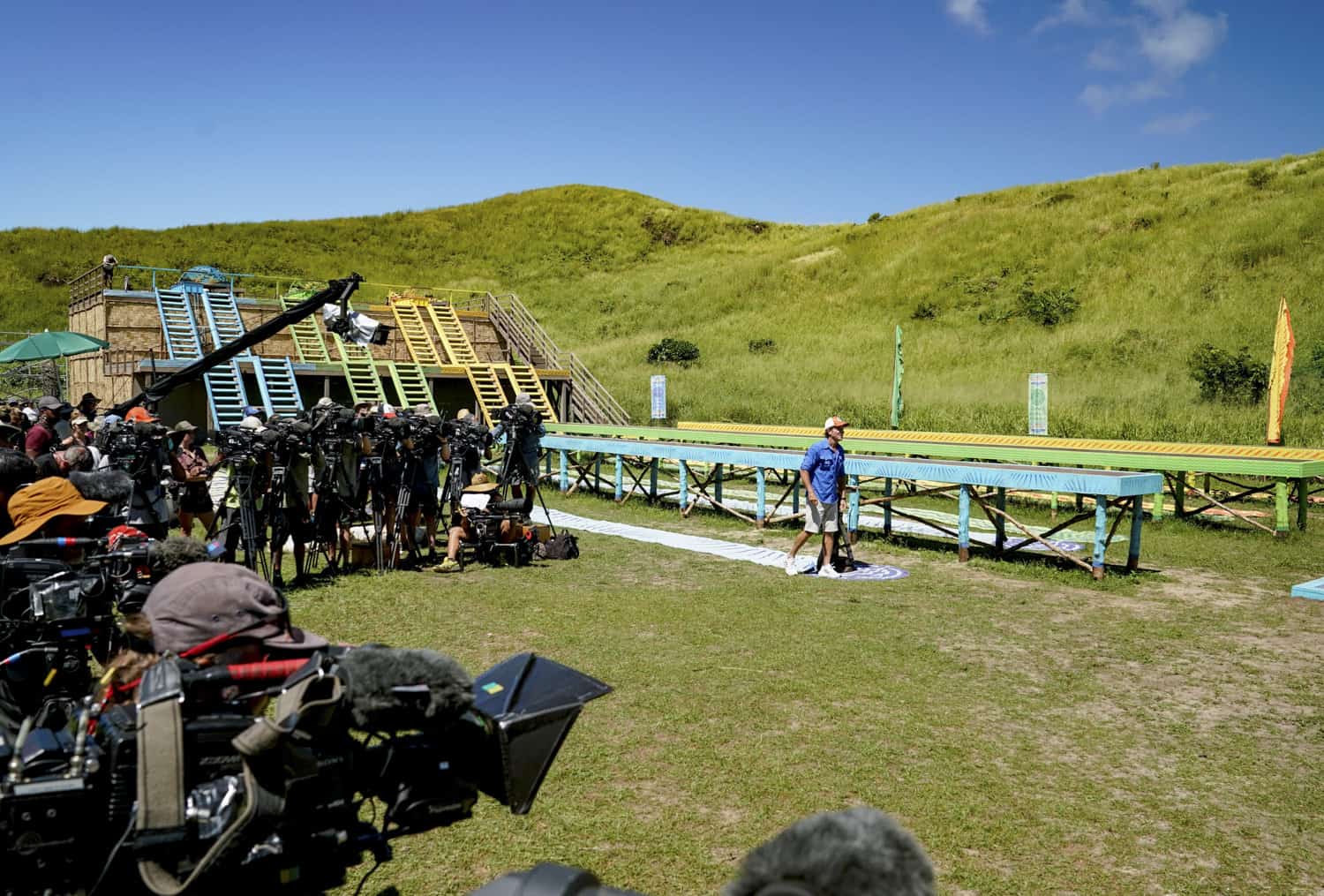
SURVIVOR 41, Day 3.
Speaking with John, who was my first interview, so to speak, for this article, was just so fascinating as he took great care to be clear and descriptive about his successful journey in order to share it properly. It is also interesting to note that John takes coffee beans that he has roasted, a hand coffee grinder, a pour-over extractor cup, and a thermos of piping hot water to the set and prepares a perfect cup of coffee for himself at every Challenge. He treated me to this beloved process during our chat. It was delightful.
I watched him work closely with his AC on the set of the Challenges. In addition to being the only handheld camera operator on the Challenges, often in an electric Zodiac boat pacing with the swimming contestants, he was also responsible for special shots on each Challenge of the Survivor Immunity Idol or the Rewards display that the contestants were competing for. His AC, Daion Chesney from Los Angeles, was new this year to not only Survivor but to reality television itself. She and I also spoke and Daion shared, “This is my first year. I started working in 2018 as an AC in scripted TV, music videos, commercials. Prior to Survivor I’ve never worked in reality camera crews. I work with studio-style ARRI, RED, and Panavision cameras.”
“Working on Survivor has been really interesting. I’m all about different challenges; I was ready for a different sort of pace. I wanted to get into reality television. I know it’s a lot different than the scripted world. I would say that probably the biggest opportunity that has been presented to me on Survivor is being able to shoot. I did two seasons now and I’ve been behind the camera more than I ever had been as an AC, and that’s really cool. This is something you don’t get in the scripted world, especially since I’m the bottom of the totem. That I was able to hop on camera and to know that I might be able to have my shot on the show is so cool.”
DIVERSITY AND INCLUSION, ONCE AGAIN
I asked Daion, a Black woman, her thoughts on the racial diversity of Survivor. “I do think there should be more diversity on the show. Yes, we do have people of color because it’s an international show. We have crew people from Nicaragua, Panama, and Dominica, but this is also an American show. To see that we’re not being represented on an American show just speaks of America at large and the industry and how diverse it isn’t and how diverse it should be. I’m very appreciative that the executive producers, Matt Van Wagenen, Jeff Probst, and Hudson Smith, are giving me and the other six people that were hired an opportunity, because they’re trying to make that pathway and give us opportunities to make this not only diverse, but inclusive. I think it’s super important. I would say yes, it’s improved, but I think there’s more work to be done. I hope next year there are more Black Americans on the show.
Circling back with Matthias Hoffmann, Reality camera operator, he offered his view on Survivor and its efforts on this topic. “I think Survivor has become more conscious about diversity and inclusion. I hope that that will be continued and it could have been done much earlier. To be honest, I think it’s good that people wake up. Full stop. I think that’s just the thing, that should be human, you should watch out for your fellow human, it doesn’t matter what color or background or belief system they have. I think that’s the most important thing that your kids should learn. It doesn’t matter how somebody looks, their beliefs, what boyfriend/girlfriend, boyfriend/boyfriend, girlfriend/girlfriend they have, whatever color in the rainbow they are, you should just accept people the way they are. That’s a fundamental thing that you should teach your kids. My kids know it and I’m proud of them. I think they live with diversity and they’d love it, they are a part of it. I think that’s great. I have a multi-colored family. I have a Chinese wife; I have half-half kids. I am happy with that. We have a crew that’s international, coming from all different kinds of backgrounds, colors, and ethnicities. I think we have a little more diversity now, which is great. I welcome growing that diversity and inclusion greatly.”
There are so many memories that we all have of our work experiences. For me, now in my fourth decade of life with film cameras, having traveled the world on a wonderfully diverse collection of projects, genres, styles, and levels of employment in camera, I can honestly say that being included in these two seasons of the television show Survivor will stay resonant and very present in my heart and mind as one of the best experiences of my career. It was a pleasure to spend time talking with the crew behind the camera, having them share their emotions, impressions, feelings, and stories about their experience working on such a special show. I have worked on many television shows, returning for several years to quite a few. I know the feeling of camaraderie and show “family” that you feel when it starts, is in process and certainly the heartbreak of when the best ones wrap. I can say, honestly, this was more than just a grand adventure for me, it was a magnificent blessing to be a part of this crew, one that I will forever remember as one of the all-time best.
Camera Operator Fall 2021
Above Photo: SURVIVOR 39: ISLAND OF THE IDOLS.
Photos by Robert Voets/CBS Entertainment
TECH ON SET
Camera and support equipment supplier: PRG Gear, previously VER
30+ SONY F-800 XDCam Cameras
Canon 40x, Fujinon 21x and 28x lenses: Arri Alexa (Scott Duncan)
RED Monstro Camera (Russ Fill)
Cablecam with a Sony FX3
4 DJI Drone Cameras
Sony IR cameras (night segment producers)
2 Stanton Triangle Jibs
BEHIND THE SCENES
Select Photo for Slideshow
David Frederick’s credits on film and TV series as a cinematographer include The Society, Get Shorty, Muppets From Space, The Soloist, Northern Exposure, Aquarius, The Bridge, and Sons of Anarchy. Currently, Dave is on location in Budapest, Hungary, working as the alternating director of photography on the new Dick Wolf series for CBS, FBI: International. Frederick shoots with every camera and format of film and digital, “There is always a story to be told with a camera. Perhaps it’s a lavish epic captured with remote heads, cranes, helicopters, Steadicam, U/W, gyro rigs or large format anamorphic cameras, or I can film handheld, with the latest small professional digital camera. The ability to share my passion and joy of filmmaking with the director, actors, and crew on any film set is what gets me out of bed in the morning. When I encounter a story rich in integrity and humanity, I thrive on bringing it to life through the lens.”
